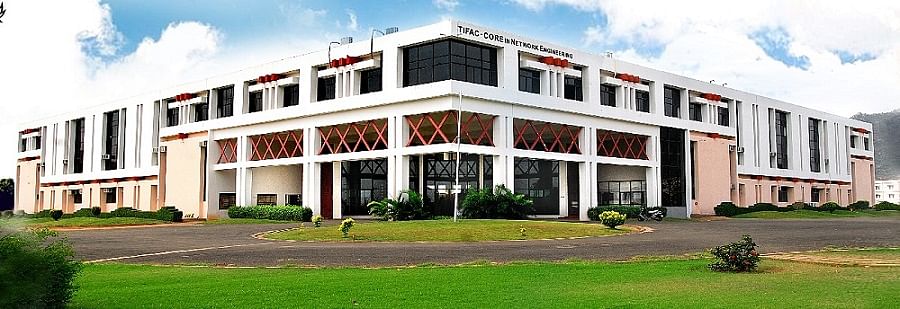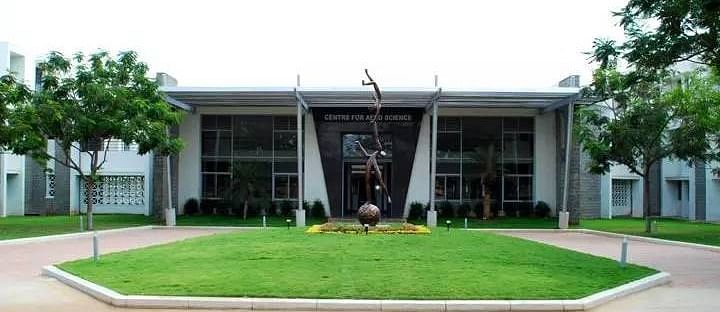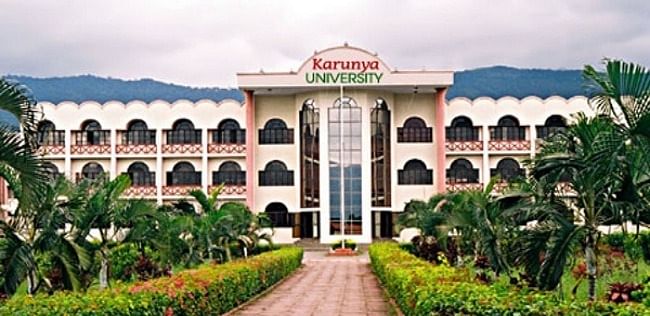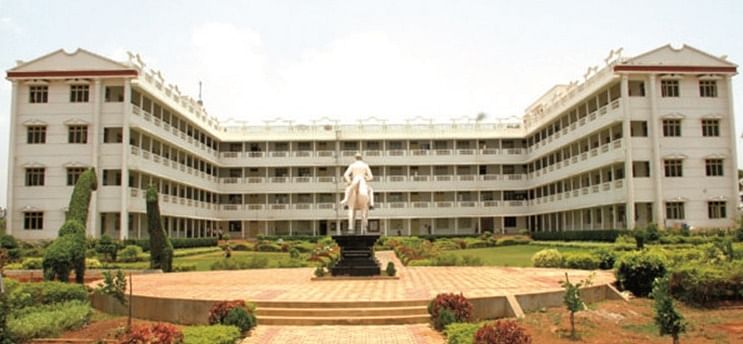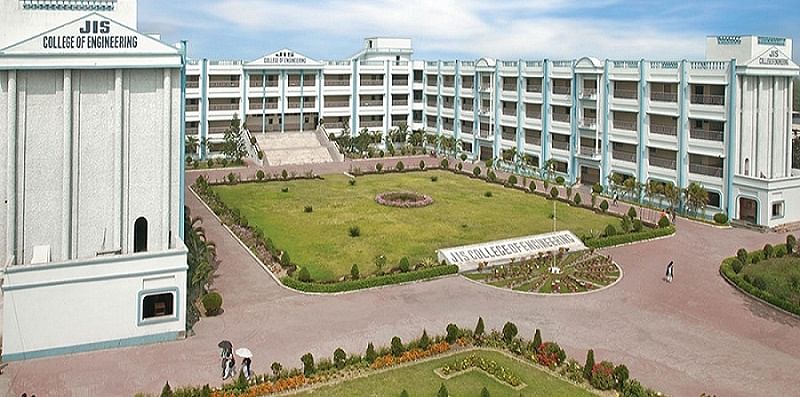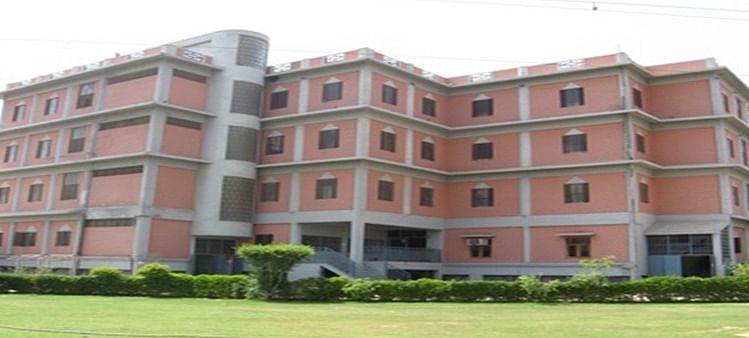B.Tech Agricultural Engineering Syllabus and Subjects

B.Tech Agriculture subjects cover essential topics such as Soil Mechanics, Soil and Water Conservation Engineering, Farm Power and Machinery, Agricultural Processing and Food Engineering, Irrigation and Drainage Engineering, etc. B.Tech Agriculture Engineering syllabus aims to equip students with the technical expertise and understanding of agricultural practices, machinery, and processing techniques.
The BTech Agriculture syllabus spans eight semesters and consists of core and elective topics. Core B.Tech Agriculture Engineering subjects include Agricultural Machinery, Soil Mechanics and Soil Dynamics, Irrigation Engineering, Post-Harvest Engineering, etc. Elective subjects cover topics such as Precision Farming Technology, Renewable Energy in Agriculture, Greenhouse Technology, etc.
The B.Tech Agricultural Engineering course equips students with an in-depth understanding of the engineering principles and its implementation in agriculture. Graduates are prepared for careers in areas such as agricultural machinery manufacturing, agricultural processing industries, and other fields related to agriculture.
Table of Contents
B Tech Agricultural Engineering Subjects
B.Tech Agriculture subjects are classified as core and elective which cover the fundamentals and skills based courses required for the advancement of technology in agriculture. In the list given below are B Tech Agriculture subjects divided into three categories:
B.Tech Agricultural Engineering Core Subjects
The core B.Tech Agricultural Engineering subjects form the foundation of the curriculum that lay the groundwork for students to understand basic concepts and principles in agriculture and engineering. The B.Tech Agricultural Engineering core subjects and topics covered under it are provided in the following table:
| Core B.Tech Agriculture Subjects | Topics Covered |
| Surveying and Levelling | Surveying, Linear Measurements, Chain Surveying, Methods of Traversing Prismatics, Quadrantal System, Plane Table Surveying, Levelling, Contouring, Advanced Surveying Technology |
| Soil Mechanics | Nature of Soil and Functional Relationships, Laboratory and Field Identification of Soils, Classification of Soils, Soil Water, Permeability, Shear Strength, Consolidation, Compaction, Earth Pressure. |
| Thermodynamics & Heat Engines | Properties, Laws of Thermodynamics, Application, Kelvin-Planck and Clausius Statements, Reversible Processes, Carnot Cycle, Steam, Steam Boilers, Air Standard Efficiency, Measurement of IP, BP, and Heat Balance Calculations. |
| Farm Machinery & Equipment | Objectives, Classification, Materials of Construction & Heat Treatment, Operation and Selection of Machines, Field Capacities & Economics, Tillag, Earth Moving Equipment, Fertilizer Application Equipment, Weed control and Plant protection equipment. |
| Watershed Hydrology | Hydrologic Cycle, Horton’s laws, Cook’s method, SCS method, Curve Number Method, Hydrograph, Flood Routing - graphical methods of reservoir flood routing, Hydrology of Dry Land Areas - Drought, Watershed Management and Planning. |
| Crop Process Engineering | Food Processing: Scope, Importance, Principles, and Methods, Processing of Farm Crops, Processing of Animal Products, – Rittinger's, Kick’s and Bond’s Equation, Mixing, Separation, Filtration, Material Handling Devices. |
| Engineering Mathematics | Matrices, Ordinary Differential Equations, Frobenius Series Solution, Laplace Transformations, Complex Analysis, Partial Differential Equations, Vector Calculus – Vector Differentiation, Vector Integration. |
| Engineering Chemistry | Water Technology, Science of Corrosion, Engineering Materials, Polymers, Nanochemistry |
| Electrical and Electronic Engineering | Electric Circuits, Magnetic Circuits, A.C. Circuits, D.C. Machines, A.C. Machines, Semiconductor Devices |
| Engineering Mechanics | Basic Concepts and Principles of Statics, Equilibrium of Rigid Bodies, Properties of Surfaces and Solids, Friction, Dynamics. |
| Engineering Drawing | Introduction to Engineering Drawing, Projection of Planes & Solids, Sections of Solids, Introduction to AUTO CAD, Isometric projection using CAD |
B.Tech Agricultural Engineering Elective Subjects
B.Tech Agricultural Engineering elective subjects allow students to specialize in specific areas of agricultural engineering based on their interest and career goals. The B.Tech Agricultural Engineering elective subjects are detailed in the table below:
| Elective B.Tech Agricultural Engineering Subjects | Topics Covered |
| Dairy Engineering | Dairy Development in India, Properties of Milk and Milk Products, Dairy Processing Systems, Process Flow Charts, Pasteurisation, Sterilization, Homogenisation, Filling & Packaging, Butter Manufacture, Dairy Plant Design. |
| Irrigation Engineering | Irrigation, Impact, Major and Medium Irrigation Schemes of India, Measurement of Irrigation Water, Water Conveyance, Soil, Water and Plant Relationship, Surface Irrigation Methods of Water Application, Participatory Irrigation Management. |
| Agribusiness Management and Trade | Management Concepts, Principles, Process, Functions, Concept of Agribusiness, Theories of International Trade, WTO Provisions for trade in agricultural and food commodities, India’s Contribution to Agricultural and Food Industry. |
| Drainage Engineering | Objectives, Problems, Surface Drainage, Derivation of Ellipse (Hooghoudt) and Ernst’s Drain Spacing Equations, Subsurface Drainage System, Drainage Materials, Leaching. |
| Hydraulic Drives and Controls | Hydraulic Basics: Pascal's Law, Flow, Energy, Work, and Power, Hydraulic Systems, Pump Classifications, Performance, Displacement, Designs, Hydraulic Actuators, Cylinders, Construction and Applications, |
| Groundwater, Wells and Pumps | Occurence and Movement, Ground Water, Aquifers, Methods of Drilling, Groundwater Exploration Techniques, Pumping Systems. |
| Tractor System and Control | Various Systems of a Tractor, Tractor Controls, Hitching and Adjustments of Farm Machinery, Road Signs, Tractor Driving Safety Rules, Dismantling and Assembling of Engines. |
Semester Wise BTech Agricultural Engineering Syllabus
The B Tech Agriculture syllabus focuses on providing candidates with technical skills and knowledge about agriculture technology and its development. The core subjects cover the fundamentals of technology and agriculture. The electives are offered generally from the third year of the course that caters to the interests of the students. The table below provides an overview of the semester-wise B Tech Agricultural Engineering syllabus:
B Tech Agricultural Engineering First Year Syllabus
In the B.Tech Agriculture first year syllabus, students delve into foundational subjects like Engineering, Mathematics, Physics, Chemistry, and basic principles of agriculture providing them with a solid groundwork. In the table given below is the Agriculture engineering syllabus:
| Semester I | Semester II |
| Engineering Physics | Engineering Chemistry |
| Mathematics - I | Mathematics - II |
| Engineering Physics Lab | Engineering Mechanics |
| Basics of Agricultural Engineering | Basic Electrical Engineering / Basic Electronics Engineering |
| Engineering Graphics | Computer Programming |
| Basic Electronics | Programming Lab |
| Environmental Studies | Engineering Mechanics Lab |
B.Tech Agricultural Engineering First Year Practicals
Apart from theoretical concepts, the following are the practical B.Tech Agriculture 1st year subjects:
- Physics Lab
- Chemistry Lab
- Computer Lab
- Electrical Workshop
- Workshop Practical
B.Tech Agricultural Engineering Second Year Syllabus
The second year B.Tech Agricultural Engineering syllabus builds on the fundamentals and students are introduced to specialized subjects such as Soil Mechanics, Farm Machinery, etc. In the table given below is the Agriculture engineering syllabus for 2nd year:
| Semester III | Semester IV |
| Soil Mechanics | Soil and Water Conservation Engineering |
| Farm Machinery and Equipment-I | Farm Machinery and Equipment-II |
| Engineering Properties of Biological Materials and Food Quality | Horticulture Crop Management |
| Fluid Mechanics | Irrigation Engineering |
| Engineering Mathematics III | Tractor System and Control |
| Farm Power | Heat and Mass Transfer |
| Statistical Methods | Engineering Hydrology |
B.Tech Agricultural Engineering Second Year Practicals
Apart from theoretical concepts, the following are the practical subjects available under the agricultural engineering subjects for the second year:
- Farm Machinery and Equipment-I
- Soil Mechanics
- Irrigation Engineering
- Crop Process Engineering
B Tech Agricultural Engineering 3rd year Syllabus
The third year syllabus of agricultural engineering advances into topics like Machine Design, Agricultural Structure, etc. In the table given below is the Agriculture engineering syllabus for 3rd year:
| Semester V | Semester VI |
| Machine Design | Drying and Storage Engineering |
| Tractor and Automobile Engines | Remote Sensing and GIS |
| Soil Conservation Structures Design | Watershed Planning and Management |
| Electrical Machines and Power Utilization | Groundwater, Wells and Pumps |
| Agroecology and Food Sustainability | Renewable Power Sources |
| Agricultural Structures & Environmental Control | Field Operation and Maintenance of Tractor and Farm Machinery |
| Drainage Engineering | Refrigeration and Air Conditioning |
B.Tech Agricultural Engineering Third Year Practicals
Apart from theoretical concepts, the following are the practical subjects available under the agricultural engineering subjects for the third year:
- Dairy and Food Engineering
- Tractor and Automobiles Engines
- Agril. Structures and Environmental Control
- Groundwater, Wells and Pumps
B Tech Agricultural Engineering 4th year Syllabus
The final year B.Tech Agricultural Engineering syllabus focuses on specialized elective courses, industry internship, and project work. In the table given below is the Agriculture engineering syllabus for 4th year:
| Semester VII | Semester VIII |
| System Engineering (Operation Research) | Minor Irrigation and Command Area Development |
| Farm Business Management and Village Industries | Agricultural Extension |
| Food Packaging Technology | Food Process Plant Design & Layout |
| Human Safety & Engineering (Elective) | Operation, Maintenance & Economic evaluation of water Resource Projects (Elective) |
| Mainstream Agricultural Engineering (Elective) | Agritech and Entrepreneurship Specialisation (Elective) |
| Dairy Engineering Specialisation (Elective) | Food Law & Legislation (Elective) |
| Seminar | In Plant Training/ Internship |
B.Tech Agricultural Engineering Fourth Year Practicals
Apart from theoretical concepts, the following are the practical subjects available under the agricultural engineering subjects for the fourth year:
- Mechanics of Tillage and Traction
- Agricultural Extension
College-Wise B.Tech Agricultural Engineering Syllabus
In India, there are more than 500 colleges offering B.Tech Agricultural Engineering with the core syllabus structure generally remaining the same across all institutions. However, slight variations may occur in the elective subjects, specific subject offerings, and academic goals based on the institutions.
Students can access the B.Tech Agricultural Engineering syllabus PDF from the official website of the desired colleges. The syllabus of the top B.Tech Agricultural Engineering colleges in India is provided below.
Kerala Agricultural University B.Tech Agricultural Engineering Syllabus
The B.Tech Agricultural Engineering syllabus at Kerala Agricultural University emphasizes a holistic approach to agricultural engineering, integrating principles of soil mechanics, farm machinery, and renewable energy sources. Listed below is the semester-wise B.Tech Agricultural Engineering syllabus offered at Kerala Agricultural University:
| Semester I | Semester II |
| Engineering Mathematics-I | Engineering Mathematics-II |
| Engineering Physics | Entrepreneurship Development and Business Management |
| Engineering Chemistry | Principles of Horticultural Crops and Plant Protection |
| Principles of soil science | Physical Education and Yoga Practice |
| Principles of Agronomy | Workshop Technology and Practices |
| Engineering Properties of Agricultural Produce | Theory of Machines |
| Engineering Mechanics | Machine Drawing |
| Engineering Drawing | Fluid Mechanics and Open Channel Hydraulics |
| Environmental Studies and Disaster Management | Strength of Materials |
| - | Surveying and Levelling |
| Semester III | Semester IV |
| Engineering Mathematics-III | Applied Electronics and Instrumentation |
| Web Designing and Internet Applications | Heat and Mass Transfer |
| Communication Skills and Personality Development | Thermodynamics and Automotive Engines |
| Post Harvest Engineering of Cereals, Pulses and Oil Seeds | Fundamentals of Renewable Energy Sources |
| Machine Design | Design of Structures |
| Electrical Machines and Power Utilization | Irrigation Engineering |
| Auto CAD Applications | Soil Mechanics |
| Building Construction and Cost Estimation | Soil and Water Conservation Engineering |
| Watershed Hydrology | - |
| Semester V | Semester VI |
| Agricultural Structures and Environmental Control | Computer Programming and Data Structures |
| Refrigeration and Air Conditioning | Post Harvest Engineering of Horticultural Crops |
| Tractor Systems and Controls | Dairy and Food Engineering |
| Farm Machinery and Equipment-I | Farm Machinery and Equipment-II |
| Bio-Energy Systems: Design and Applications | Tractor and Farm Machinery Operation and Maintenance-II |
| Tractor and Farm Machinery Operation and Maintenance-I | Energy Technology for Renewable Power Production |
| Sprinkler and Micro Irrigation Systems | Ergonomics in Farm Machinery |
| Drainage Engineering | Groundwater, Wells and Pumps |
| Water Harvesting and Soil Conservation Structures | Watershed Planning and Management |
| Skill Development Training-I | Remote Sensing and GIS Applications |
| Semester VII | Semester VIII |
| Educational Tour | Elective course |
| 20-Weeks Industrial Attachment/Internship | Elective course |
| Skill Development Training-II | Elective course |
| - | Project –Planning, Work and Report Writing |
| - | Seminar |
AKS University B.Tech Agricultural Engineering Syllabus
At AKS University, the B.Tech Agricultural Engineering syllabus is designed to foster innovation and problem-solving skills among students, with a focus on emerging technologies such as remote sensing, GIS applications, and renewable energy sources. The semester-wise B.Tech Agricultural Engineering syllabus offered at AKS University is provided in the table below:
| Semester I | Semester II |
| Engineering Mathematics-I | Engineering Physics |
| Engineering Physics | Engineering Chemistry |
| Engineering Chemistry | Workshop Practice & Technology |
| Workshop Practice & Technology | Surveying and Leveling |
| Surveying and Leveling | Engineering Drawing |
| Environmental Science | Agriculture for Engineers |
| Agriculture for Engineers | Operation & Maintenance of Tractor and Farm Machinery |
| SSD – Functional English I | - |
| Semester III | Semester IV |
| Engineering Mathematics-III | Farm Machinery and Equipment-II |
| Soil Mechanics | Renewable Energy Sources |
| Strength of Materials | Irrigation Engineering |
| Farm Machinery and Equipment-I | Crop Process Engineering |
| Farm Power | Engineering Hydrology |
| Fluid Mechanics | Theory of Machines |
| Engg. Properties of Biological Materials and Food Quality | Agribusiness Management and Trade |
| Heat and Mass Transfer | Agril. Statistics |
| Semester V | Semester VI |
| CAD/CAM-M/c Drawing & Computer Graphics | Agril. Structures and Environmental Control |
| Machine Design | Drying and Storage Engineering |
| Dairy and Food Engineering | Design of Structures |
| Tractor Systems and Controls | Groundwater, Wells and Pumps |
| Electrical Machines and Power Utilization | Soil and Water Conservation Structures |
| Soil and Water Conservation Engineering | Refrigeration and Air Conditioning |
| Drainage Engineering | Entrepreneur. Develop. & Technical Report Writing |
| - | Micro Irrigation System Design |
| Semester VII | Semester VIII |
| Watershed Management | Minor Irrigation and Command Area Development |
| Remote Sensing & GIS Applications | Food Process Plant Design & Layout |
| System Engineering (Operation Research) | Mechanics of Tillage and Traction |
| Food Packaging Technology | Elective-II |
| Elective-1 | Dissertation/ Project-II |
| Seminar | Seminar |
| Dissertation/ Project-I | Comprehensive Viva-voce |
B.Tech Agricultural Engineering Course Structure
The B.Tech Agricultural Engineering course structure comprised a combination of core subjects, elective subjects, practical and hands-on training, internships, industrial visits, and project work. The B.Tech Agriculture course structure followed by most of the institutions can be outlined as follows:
- Core Subjects
- Elective Subjects
- Eight Semesters
- Lectures
- Laboratory Practicals
- Seminars
- Projects
- Internships
B.Tech Agricultural Engineering Teaching Methodology and Techniques
The teaching methodology in B.Tech Agriculture engineering syllabus combines well-trained faculties, adequate study materials, and teaching new technologies, tools, and techniques. Industrial visits along with lab trials form an important part of the curriculum.
The teaching methodology and techniques followed by the agricultural engineering colleges are given below:
- Practical Sessions
- Group Discussion
- Assignments
- Quizzes
- Tutorials
- Workshop
- Teachers Assessment
- Class Tests
- End Semester Examination
B.Tech Agricultural Engineering Projects
The Agricultural Engineering syllabus includes a wide range of topics that engage students. The projects consist of a minimum of 8 credits which is essential for candidates to pass through final year. Listed below are some of the popular B.Tech Agricultural Engineering Projects are:
- Design and fabrication of a solar-powered irrigation system.
- Develop smart crop monitoring and management systems using IoT.
- Design and implement precision farming robots for weed control.
- Evaluation of drip irrigation systems for water use efficiency in agriculture.
- Design and construct a low-cost greenhouse for year-round vegetable production.
- Develop a solar dryer for agricultural produce preservation.
- Conduct a study on the utilization of agricultural waste for biofuel production.
- Design and construct a biogas plant for on-farm energy generation.
- Evaluate different irrigation scheduling techniques for maximizing crop yield and water use efficiency.
B.Tech Agricultural Engineering Reference Books
B.Tech Agricultural Engineering subjects can be better understood with the help of reference books that explain the advanced concepts of engineering applied in agriculture. Listed below are essential B.Tech Agriculture Engineering books which can be used for reference in the B.Tech Agricultural Engineering syllabus:
| B.Tech Agriculture Books | Topics Covered | Authors |
| Soil Enzymology (Soil Biology) | Concepts and applications of Soil Enzymology, Role of Enzymes in Soil Processes, Enzyme Activities and Soil Fertility. | Ajit Varma and Girish Shukla |
| Pulses and Vegetables (Underutilized Crop) | Cultivation and Management Practices of Pulses and Vegetables, Importance of Underutilized Crops in Agriculture and Food Security. | Jack Dongarra |
| Landscape Erosion and Evolution Modeling | Landscape Erosion Processes and Mechanisms, Modelling Approaches for Predicting Erosion Rates and Patterns, Impacts of Erosion. | Russell S. Harmon and William W. Doe III |
| Coastally Restricted Forests (Biological Resource Management Series) | Ecology and Biodiversity of Coastally Restricted Forests, Conservation Challenges for Coastal Forest Ecosystems, Sustainability. | Aimlee D. Laderman |
| High-Tech and Micropropagation V: 5 (Biotechnology in Agriculture and Forestry) | Micropropagation in Plant Biotechnology, Crop Improvement and Plant Breeding, Role of Biotechnology in Enhancing Agricultural Productivity. | Y.P.S. Bajaj |
Top B.Tech Agricultural Engineering Colleges
Top Agriculture Entrance Exams
B.Tech Agricultural Engineering Fee Structure
FAQs on B.Tech Agricultural Engineering Syllabus and Subjects
Q: What are the subjects in B.Tech in Agricultural Engineering?
Q: Is B Tech Agricultural Engineering a good course?
Q: Is there maths in B.Tech Agriculture?
Q: What are the B.Tech Agriculture 1st year subjects?
Q: What is the importance of Soil Mechanics in Engineering
Q: What is the BTech Agriculture Engineering subjects list for second year?
Q: Is biology compulsory for BTech Agriculture?
Q: How assessment are conducted in BTech Agri Engineering Syllabus?
Q: Are there any modelling techniques used in BTech Agricultural Engineering syllabus?
